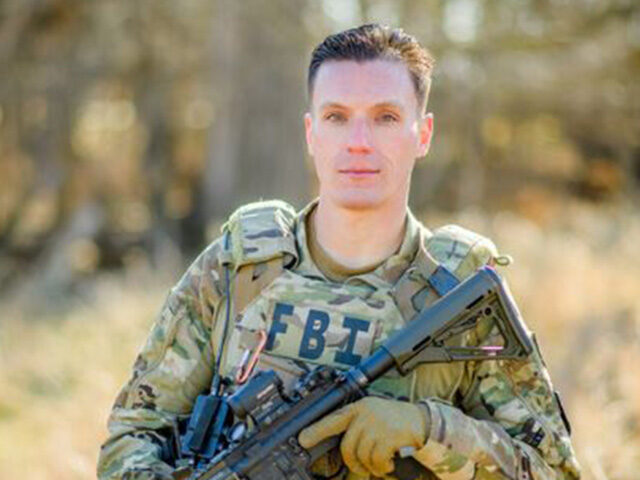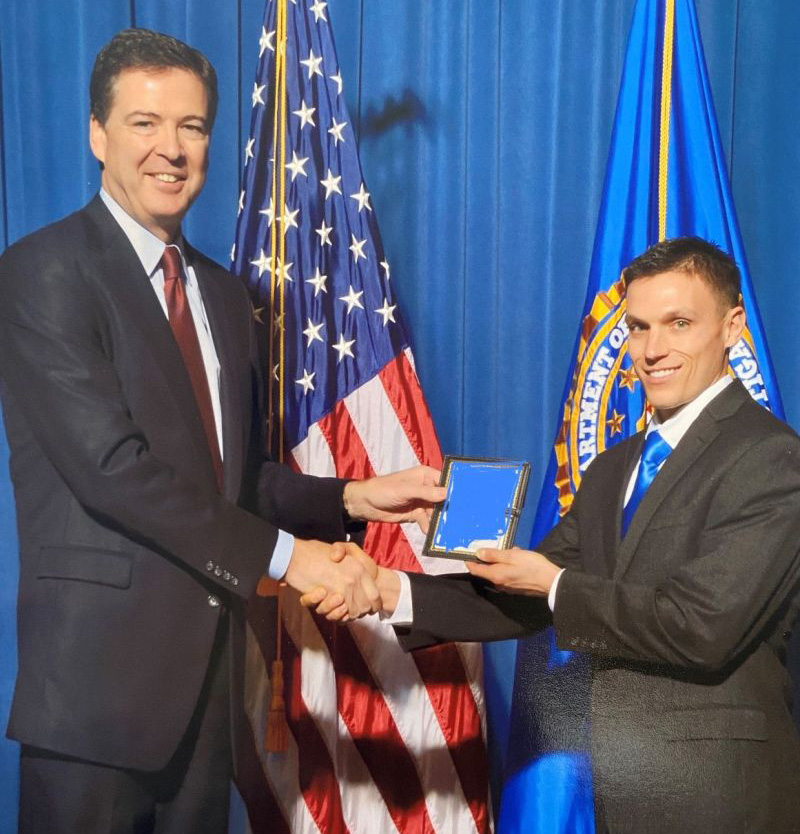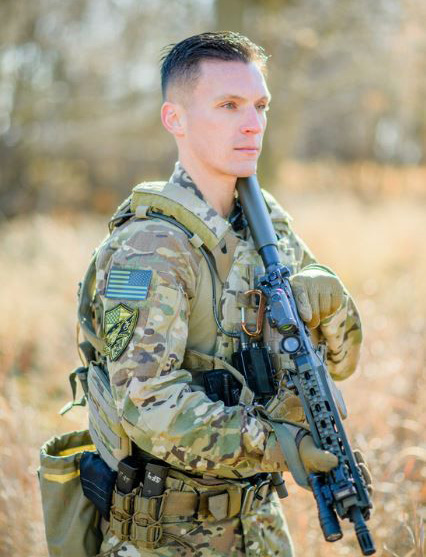Stephen Friend, a suspended FBI special agent, is awaiting a response from federal oversight officials to an affidavit he filed last week alleging that the FBI mishandled cases related to the January 6 riot and that the FBI then retaliated against him after he reported the alleged wrongdoing up the bureau’s chain of command.
Friend filed the affidavit, a ten-page document obtained by Breitbart News, with the Office of Special Counsel (OSC) and Office of Inspector General (OIG) on September 21 after the FBI suspended his security clearance on September 19.
Friend, a 37-year-old father of two who has worked at the FBI for eight years, is now being forced to use his leave time as a result of the suspension while he waits for the FBI to decide its next steps and, as a parallel matter, while he waits for both the OSC to address the affidavit, which the OSC is required by statute to do, and the OIG to decide if it will investigate the claims in the affidavit.
The suspended agent first came into the spotlight anonymously by making whistleblower claims against the FBI through House Judiciary Committee ranking member Rep. Jim Jordan (R-OH), according to a public a letter sent September 19 from Jordan to FBI Director Christopher Wray.
Jordan’s office confirmed to Breitbart News that Friend was the whistleblower referenced in that correspondence, a fact the office had kept confidential until Friend was suspended and subsequently permitted the office to disclose his name.
The allegations laid out in Jordan’s letter align with those Friend made in the affidavit about the FBI’s handling of January 6 cases. Friend alleged in the affidavit the FBI inappropriately prioritized January 6 cases over other matters, gratuitously used a SWAT team for a January 6 arrest, and inflated the national threat of domestic violent extremism.
Friend noted in the affidavit he refused to participate in investigative work related to January 6 and that he reported his concerns about the work to multiple supervisors. The suspended agent laid out how he believed the FBI’s subsequent adverse personnel actions against him amounted to whistleblower retaliation.
Prioritizing January 6 cases
Friend was transferred in June 2021 to the FBI’s Jacksonville Field Office to work as a special agent investigating child exploitation and human trafficking but, within months, was reassigned to investigate domestic terrorism “due to the voluminous number of J6 investigations,” Friend wrote in the affidavit.
Friend stated of his reassignment from child exploitation to domestic terrorism:
In October 2021, an Assistant Special Agent in Charge (ASAC) informed my supervisor that I was reassigned as a member of the Joint Terrorism Task Force and directed to concentrate my time towards domestic terrorism investigations. The ASAC communicated that the reassignment was necessary due to the voluminous number of J6 investigations and rising threats of “domestic violent extremism.”
Friend added, “I was also told that child sexual abuse material investigations were no longer an FBI priority and should be referred to local law enforcement agencies.”
Using a SWAT team
Friend charged in the affidavit that the FBI needlessly used a SWAT team for an arrest amid its arrests and searches of January 6 subjects. Friend wrote that he expressed his concern that “it was inappropriate” to use a SWAT team for an individual charged with misdemeanors to Senior Supervisory Resident Agent Greg Frederico on August 19. Friend said he also “opined” to Frederico “that the subject would likely face extended detainment and biased jury pools in Washington D.C.”
Friend wrote that he “suggested alternatives” instead of a SWAT team to Frederico “such as the issuance of a court summons or utilizing surveillance groups to determine an optimal, safe time for a local sheriff deputy to contact the subjects and advise them about the existence of the arrest warrant.”
Federico, Friend wrote, “told me that FBI executive management considered all potential alternatives and determined the SWAT takedown was the appropriate course of action.”
Assigning January 6 cases across the country
Friend also wrote that he found the FBI’s practice of assigning January 6 cases to field offices around the country based on the case subjects’ hometowns to be “atypical.”
Friend stated that, per FBI policy, he believed cases should have been assigned to the Washington Field Office given the incident took place in Washington and given a Washington-based January 6 task force was conducting the bulk of the work on the cases.
“The manipulative casefile practice creates false and misleading crime statistics, constituting false official federal statements,” Friend wrote. “Instead of hundreds of investigations stemming from an isolated incident at the Capitol on January 6, 2021, FBI and DOJ officials point to significant increases in domestic violent extremism and terrorism around the United States.”
Jordan, who has vetted well over a dozen FBI whistleblower allegations this year, previously brought to light the FBI’s “artificial case categorization scheme” and the generally “scandalous” nature of padding domestic violent extremism cases.
Alleged retaliatory action
Friend wrote that on August 23, he met with his superiors Assistant Special Agent in Charge Coult Markovsky and Assistant Special Agent in Charge Sean Ryan and disclosed his FBI policy violation concerns, including that they could lead to violations of the Brady rule requiring prosecutors to disclose exculpatory evidence to defendants and the Sixth Amendment right to a fair trial.
According to Friend, Coult and Markovsky asked Friend during the meeting if he believed the January 6 rioters committed a crime and Friend replied that he believed “some of the people who entered the Capitol committed crimes, but others were innocent” and that some of the innocents had been “unjustly prosecuted, convicted, and sentenced.”
Markovsky during the meeting also “unironically asked if I thought that the individuals who ‘killed police officers’ should be prosecuted,” Friend wrote.
Friend stated that when he replied that no police officers were killed on January 6, Markovsky said Friend was “being a bad teammate to [his] colleagues” and then warned Friend that refusing to work on the January 6 cases could be deemed insubordination.
“References were made to my future career prospects with the FBI,” Friend wrote of the meeting, adding that Ryan “suggested I might want to speak with the FBI’s employee assistance program about my emotional concerns with the J6 cases.”
Hours after the meeting, Markovsky allegedly emailed Friend informing him that he was being placed on Absent Without Leave (AWOL) status, which Markovsky noted could “lead to” further job action.
Friend also stated that on September 1, he had a meeting with Special Agent in Charge Sherry Onks during which Onks told him he had “a reputation as a good Special Agent” but that she “expressed disappointment” with his refusal to work on January 6 investigations.
Friend recalled that Onks spoke emotionally during the meeting about how the January 6 riot “threatened the United States’ democracy”:
I again disclosed by informing SAC Onks that I believed the investigations were inconsistent with FBI procedure and resulted in the violation of citizens’ Sixth and Eighth Amendment rights. I added that many of my colleagues expressed similar concerns to me but had not vocalized their objections to FBI Executive Management. SAC Onks disagreed with my premise and said that my views represented an extremely small minority of the FBI workforce. SAC Onks told me that she had never encountered my situation during her career. She recalled the fear she felt while sitting on the seventh floor of the J. Edgar Hoover Building on January 6, 2021 when protestors ‘seized the Capitol’ and threatened the United States’ democracy. Onks reprised against me and admitted as much, when she informed me that she referred me to the FBI’s Office of Professional Responsibility and Security Division. SAC Onks told me that the Security Division was assessing my security clearance.
“At no point was I advised or counseled on where to take my disclosure beyond the reprising officials. … The threatened reprisal constituted a de facto gag on my whistleblowing,” Friend wrote.
On September 19, Friend was brought into a meeting with his supervisors and told his security clearance was suspended “pending an investigation,” he wrote, noting his credentials, gun, and badge were confiscated and that he was escorted out of the building.
Asked if Friend’s suspension amounted to whistleblower retaliation, the FBI said in a statement provided to Breitbart News it could not comment on specific personnel matters but that FBI employees are “held to the highest standards because their work is critical” to the FBI mission.
“Employees who don’t carry out their responsibilities are held accountable through an objective administrative process,” the bureau stated. “FBI employees who report evidence of wrongdoing through a protected disclosure are protected from retaliation. Such reporting supports the FBI’s mission and is fully consistent with our core values.”
Republican congressmembers have raised the alarm on Friend’s case, including Jordan and Sens. Chuck Grassley (R-IA) and Ron Johnson (R-WI).
In addition to Jordan telling his millions of followers through social media and television appearances that he believes the FBI retaliated, Grassley and Johnson sent a letter to Wray and Attorney General Merrick Garland on Monday citing the affidavit and demanding Friend’s suspension be lifted.
“Under federal whistleblower laws, employees of the Federal Government have not only a right but a responsibility to report evidence of potential wrongdoing. That is precisely what Special Agent Friend has done,” the senators wrote. “Accordingly, the FBI should immediately cease the disciplinary actions it is actively taking to punish Special Agent Friend for his protected whistleblowing activity.”
Write to Ashley Oliver at aoliver@breitbart.com. Follow her on Twitter at @asholiver.



COMMENTS
Please let us know if you're having issues with commenting.